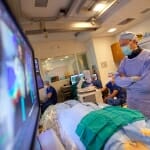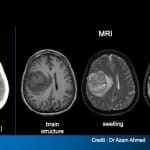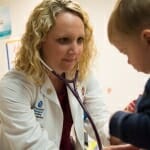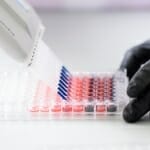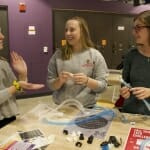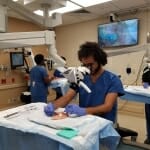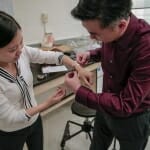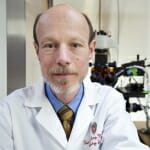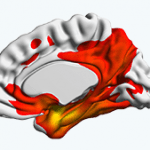Tag Health & medicine
Stem cell scientists clear another hurdle in creating transplant arteries
Scientists at the Morgridge Institute for Research are one step closer to realizing their dream of creating artery banks with readily-available material to replace diseased arteries during surgery.
Commencement spotlight: UW grad uses brother’s injury as inspiration for research
Stefanie Henry will graduate from UW as a double major in neurobiology and French, along with an extensive background in nervous system trauma research that is inspired by her brother’s spinal cord injury.
Nursing student upholds family tradition as fourth-generation Badger nurse
Following in the footsteps of her great-grandmother, grandmother and aunt, Emily Hanna is the fourth in her family to take part in UW–Madison’s nursing program. The program has seen some serious changes in that time.
Doctor’s brainstorm being realized at UW–Madison spinoff
Atrility hopes to market a device that would help in pediatric heart surgery. The design was begun by students in UW–Madison’s department of biomedical engineering.
MR Guidance: Next frontier in hemorrhagic stroke
A UW–Madison startup called InseRT MRI has the goal of guiding drug placements in the brain with MRI, under a license to a patent held by WARF.
Cell component breakdown suggests possible treatment for multiple neural disorders
New UW–Madison research provides the first direct evidence that mitochondria dysfunction contributes to fragile X and autism, raising hope for new therapeutic developments.
Program helps address shortage of physicians in rural areas
The program was created due to the shortage of physicians in rural Wisconsin. While 29 percent of Wisconsin residents live in rural locations, only 13 percent of physicians in Wisconsin have rural practices.
Undergrads design ventilator device; form company to aid newborns during surgery
Undergraduates in biomedical engineering created an improved "wye" that connects airway tubes for infants during surgery. They've applied for a provisional patent.
Blue “blood” gives residents innovative microsurgery training
To train residents in microsurgery, UW physicians have developed the “blue-blood” chicken thigh simulator. Residents suture blood vessels together in chicken thighs perfused with IV fluid dyed blue.
Nursing pioneer Signe Skott Cooper: From the farm to the battlefield
Cooper devoted more than 60 years to nursing education at UW–Madison and within the UW System. Her wartime service shaped her life, personally and professionally.
New Faculty Focus: Anne Ersig
"My goal with my teaching and research is to improve the health and well-being of individuals with childhood chronic health conditions."
Recovering from a heart attack? Hold the antibiotics
An international team of researchers has shown in mice that a healthy gut microbiome is important for recovery after a heart attack.
$19M grant to aid research on early signs of Alzheimer’s
The Wisconsin Registry for Alzheimer's Prevention has received a five-year grant from the National Institutes of Health for an in-depth study of molecular signs of the disease in brain and spinal fluid.
Vaccine opt-outs dropped — barely — when California added more hurdles
A law requiring that parents who wanted to exempt their children from vaccines to get the signature of a healthcare provider slightly reduced the proportion of unvaccinated children entering kindergarten in California.
A starring role for nonhuman primates in the stem cell story
“If UW–Madison is the birthplace of human embryonic stem cells, then the Primate Research Center is the cradle,” says Marina Emborg, director of the center's Preclinical Parkinson's Research Program.





